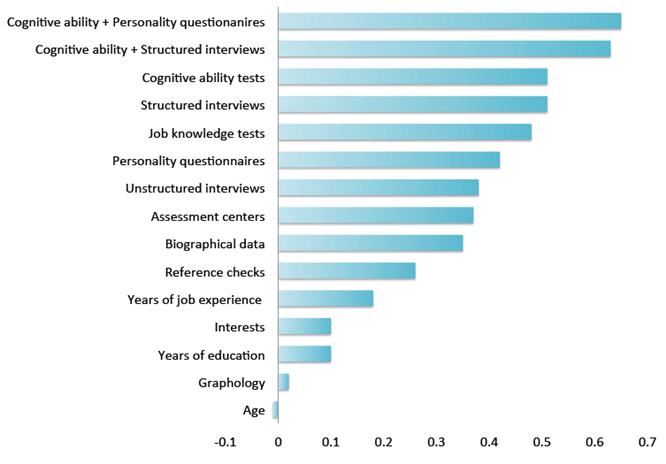Psychometrics Improve Candidate Selection

How do you know when someone is right for the job? Is it their glowing resume or their interesting and witty answers to your interview questions? Maybe they are related to the CFO? If the job is very well defined and easy to observe, like driving a forklift, the best way is to observe and test their performance. But for management and executive roles, which require a complex mix of cognitive, collaborative, and leadership capabilities, seeing these skills in action during the interview process is close to impossible. This increases the difficult and the risk in selecting candidates for these roles. Pre-employment psychometric testing and assessments offer a better answer.
Organizational Psychologists have been comparing different approaches for selecting candidates since the 1950s. The most significant area of development around candidate assessment research has been the use of meta-analytic studies. These have increased our confidence in the validity of selection methods. Meta-analytic studies use statistical models to pull together a range of research findings from different studies to create a clear, integrated picture of overall research. By reducing or removing the impact of sampling errors, range restrictions and measurement unreliability these studies extend the value of the individual research projects.
Psychometrics Can Help You Predict Performance

The results of these assessment and selection meta-studies show that psychometric testing is much more powerful than originally thought. In fact, these studies tell us that psychometrics are the most objective and reliable method of selection for hiring decisions. They are able to predict candidate performance and the amount of support they may need in their role.
Let’s take a look at the results of the largest meta-analysis of selection methods. The predictions are measured on a 0 to 1 scale that describes how well the selection method scores predict future job performance. A zero correlation means that there is no link between the assessment method and the subsequent job performance. Measures that get close to a zero rating such as graphology (handwriting analysis) are no better than random selection and so have no scientific basis. A score of 1 would mean that the method would be correct every time. Unfortunately only hindsight scores a perfect 1.
Of the remaining methods, the common unstructured interview scores a 0.4. That is about the level at which we start to believe it is helpful. To give a comparison, 0.4 also happens also to be the approximate correlation between LSAT scores and first year grades in law school. And while, in a future post, we will discuss how interviews can be improved, there are other options which more effective guides for your hiring.
Cognitive ability tests, sometimes known as General Mental Ability (GMA) tests and one of the core elements of psychometric tests, measure people’s intellectual capability. People who get high scores are fast learners who can adapt quickly to new situations and cope well with complex concepts. People with lower scores take longer to acquire new skills and are likely to require things to be more clearly explained to them. Changing jobs is one situation where it helps to have a higher intellectual capability. It is therefore unsurprising that cognitive ability tests correlate well with later job performance, measuring over 0.5.
Combinations of Psychometrics Give the Best Guidance
But it is when we combine cognitive ability tests with other methods that we get really impressive results. Scores of 0.6 or higher are regarded as strong predictors. On their own, personality tests get a 0.43 predictive correlation. Better than unstructured interviews, but not as good as cognitive ability tests. However, when you combine the cognitive ability assessment with the personality questions you get the most effective method for candidate selection. The two methods complement each other.
For example, a personality questionnaire may identify a candidate as highly confident. This trait suggests someone who is likely to make quick decisions. Is this good or bad? If the candidate scores well on the cognitive ability test as well, then they are likely to make fast accurate decisions. That’s good! However, if they do not score well on the cognitive ability test then they may well be prone to misinterpreting information and so make fast but incorrect or poorly judged decisions. Being highly confident they are then likely to blame others for these mistakes. So understanding and interpreting the results of both methods in combination provides a much richer and more nuanced view of the candidate.
At PeopleFactors we have been providing multi-lingual leadership assessments rooted in psychometrics for world-class organizations for more than 35 years. We always start with a personality questionnaire and a cognitive ability test. We often combine these with other testing tools and assessments. In our own studies we have seen several cases where the predictive correlation has exceeded 0.8. To achieve these kind of scores requires a strong partnership with our clients. This ensures that the assessments are tuned for their company, culture and capabilities so that they can assess candidates’ fit with their roles and organization.
If you would like to know more about how carefully selected psychometric leadership assessments can add objective analysis to your candidate selection, don’t hesitate to reach out.
You can read more about our online pre-hire assessment tools here.
